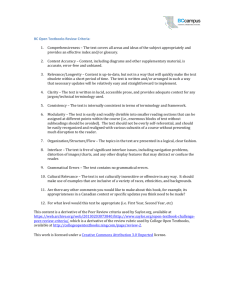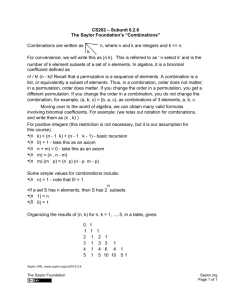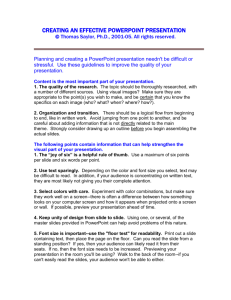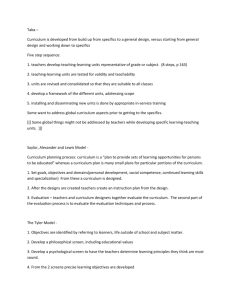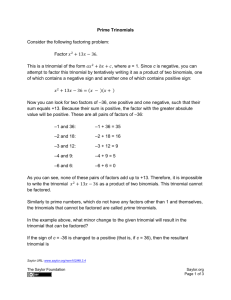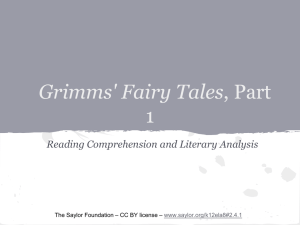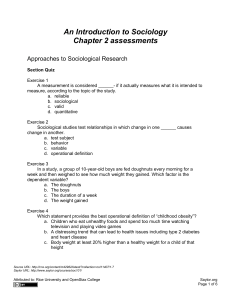Read the First Chapter - Cherokee McGhee Publishing
advertisement
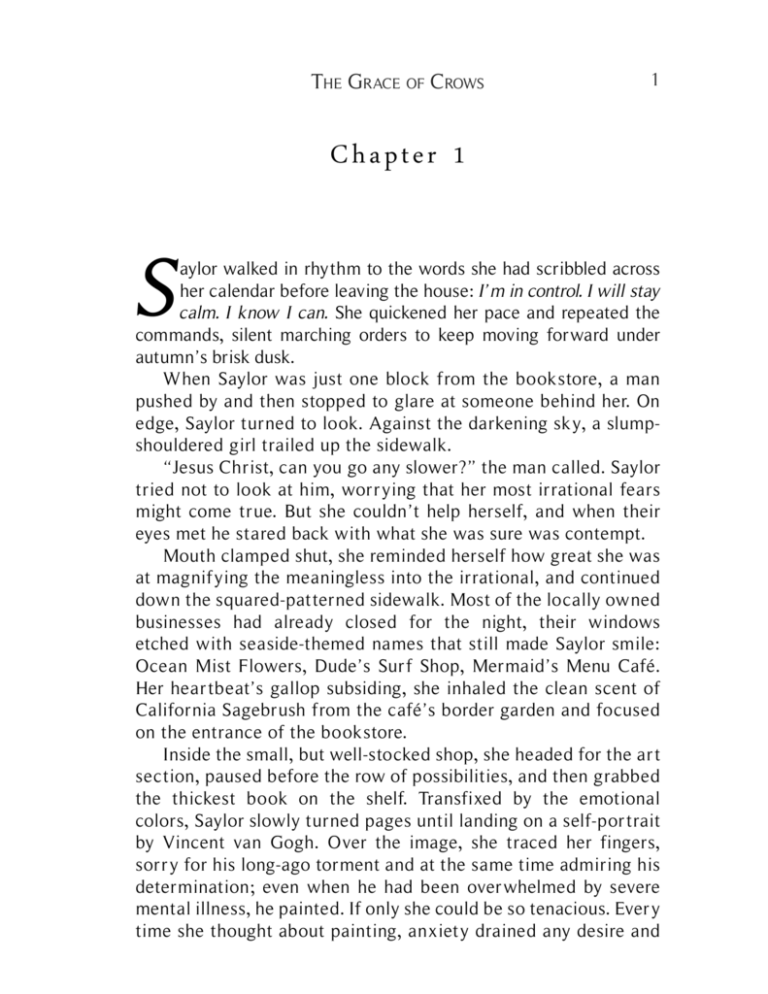
THE GRACE OF CROWS 1 Chapte r 1 S aylor walked in rhythm to the words she had scribbled across her calendar before leaving the house: I’m in control. I will stay calm. I know I can. She quickened her pace and repeated the commands, silent marching orders to keep moving forward under autumn’s brisk dusk. When Saylor was just one block from the bookstore, a man pushed by and then stopped to glare at someone behind her. On edge, Saylor turned to look. Against the darkening sky, a slumpshouldered girl trailed up the sidewalk. “Jesus Christ, can you go any slower?” the man called. Saylor tried not to look at him, worr ying that her most irrational fears might come true. But she couldn’t help herself, and when their eyes met he stared back with what she was sure was contempt. Mouth clamped shut, she reminded herself how great she was at magnifying the meaningless into the irrational, and continued down the squared-patterned sidewalk. Most of the locally owned businesses had already closed for the night, their windows etched with seaside-themed names that still made Saylor smile: Ocean Mist Flowers, Dude’s Sur f Shop, Mermaid’s Menu Café. Her hear tbeat’s gallop subsiding, she inhaled the clean scent of California Sagebrush from the café’s border garden and focused on the entrance of the bookstore. Inside the small, but well-stocked shop, she headed for the ar t section, paused before the row of possibilities, and then grabbed the thickest book on the shelf. Transfixed by the emotional colors, Saylor slowly turned pages until landing on a self-por trait by Vincent van Gogh. Over the image, she traced her fingers, sorr y for his long-ago torment and at the same time admiring his determination; even when he had been over whelmed by severe mental illness, he painted. If only she could be so tenacious. Ever y time she thought about painting, anxiety drained any desire and 2 T R AC Y S H AW N all she had left was getting through the day, pushing down fear. She straightened her back. She had to stop feeling so sorr y for herself, and thought about how her best friend Lucy, who would remind her to “Quit debilitating yourself with such asinine quibble.” Saylor breathed in the ar t book’s glossy-paged newness and focused on the safe anonymity of Dune Beach’s sole remaining bookstore. A slight freckled woman sur veyed the cookbook section. An old man wearing a canar y-yellow sweater thumbed a paperback from the bargain table, and a young guy with a wolf tattoo howling up the side of his neck sat cross-legged on the carpeted f loor by the magazine section, a thick literar y-looking publication open on his lap while he texted on his cell. But when she caught sight of the man from the sidewalk, her stomach lurched. Under the f luorescent light, Saylor eyed his profile. He looked to be in his early fifties, just a few years older than herself, but a hell of a lot thinner. He spor ted a black workout shir t and running shor ts, his legs showing the taut leanness of an over-disciplined marathon runner, his face, the gaunt-cheeked look of self-deprivation. Arms crossed, he faced the young girl, undoubtedly his daughter, and spoke to her in a loud whisper. “I’m telling you, you need to lose weight.” The girl’s scrubbed-pink skin and old-fashioned Dutch boy haircut made Saylor feel even more protective. Although the girl was bigger-boned and taller than Saylor’s fifteen-year-old daughter, Brooke, she looked a couple of years younger. With the normal, yet self-conscious pudginess of a budding teen, the girl tugged down her T-shir t to cover the doughy skin between her stomach and low-rise jeans. With an irritated frown on her face, the girl tried to shrug off the hawk-like clasp of her father’s hand on her shoulder. “Dad, why can’t you just leave me alone? I want to check out the ar t section. I don’t want to look at any stupid diet books.” His grip still on the girl, the father pushed his face too close to hers. “If you don’t care what you look like, don’t be surprised if no one else does either. But as your father, I’m telling you that THE GRACE OF CROWS 3 you should have lost your baby fat by now.” The girl’s light blue eyes watered and her fists clenched over her stomach in a protective fighter-like stance. Finally, the father released his hand from her shoulder, but continued to stare her down, unblinking as if he were tr ying to hypnotize her. Eyes aver ted, Saylor worried again that her irrational fear would come true — that in her agitation, she would blur t out invading thoughts without any filter of control. Her hear t thudded so hard that all sounds became muff led. Panicked, she wanted to bolt, but didn’t want to abandon the girl. His face hard with judgment, the father leaned toward his daughter. “You don’t want to get as fat as your mother, do you?” That did it. Unable to resist, Saylor snapped the book shut and looked straight at the man’s sunken eyes. A shout f lew through her brain: You goddamned bastard. She held her breath, telling herself that she couldn’t have possibly said it out loud. But the man stared at her and bellowed, “What?” Like a stupefied rabbit, Saylor froze. “Nothing,” she managed to say, straining to sound innocent. This could not be happening. “Bitch.” He narrowed his eyes, then turned to his daughter as if Saylor had disappeared. “I’m going to get some coffee. If you don’t pick out a diet book by the time I’m done, your cell is gone for a week.” For a moment more, he stood with the challenging stance of a bullying coach while his daughter determinedly looked past him. Finally, he headed toward the in-store coffee bar, and the girl exhaled. She f lashed Saylor a quick, sly smile, then left. Saylor wanted to follow the girl and tell her that she was per fectly fine. It was her father who had the problem, yet her legs had grown nightmare-paralyzed and beneath her shoes, the pukebrown Berber stuck like the muck of unhappy memories. She told herself the man must have just been angr y with her for slamming her book shut and looking at him, but he did say bitch, didn’t he? That was surely too vehement for merely catching a stranger’s eye, even if he was such an asshole. And the girl’s smile was conspiratorial, as if she thought it funny that Saylor had called her father a bastard. Yes, the possibility was more than strong 4 T R AC Y S H AW N that she had blur ted it out. Now instead of just grappling with the what-if anxiety, she had to seriously consider that her fears might be true. She needed to get a grip. Not knowing what else to do, Saylor turned her attention to the book. Maybe this dead ar tist had some kind of answer. She f lipped through the pages, and randomly pointed a shaky finger at a sentence, landing on the last words Van Gogh had supposedly uttered to his brother, Theo: “The sadness will last forever.” Saylor shoved the book back on the shelf, reminding herself how Van Gogh had been more than just fear ful. Near the front door, she knocked her hip against a table stacked with the latest slick-covered self-help books. She heard the man’s chor tle and realized he was watching her. Instinct told her not to look back; still, her head jerked over her shoulder. Immobile in the spotlight of his scrutiny, she felt the roll of her stomach over the too-snug waist of her increasingly tight jeans and wished that she had worn her looser sweatshir t instead of the unforgiving thermal that exposed ever y bulge. He held up his coffee cup and winked, seemingly enjoying his power over her, a smirk spreading on his thin lips. Before her trapped feeling of nausea grew, she made herself break loose from his gaze, turned her focus on the door, banged it open and f led outside. Now her fears had really got her.
